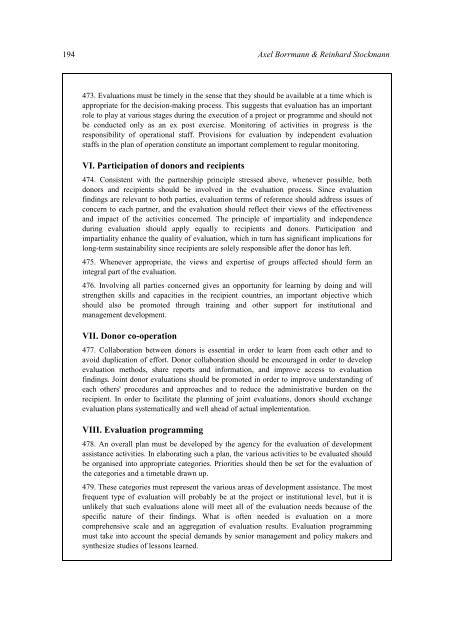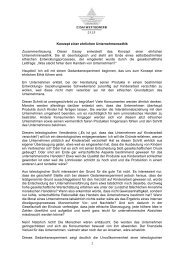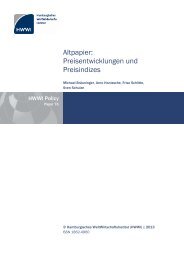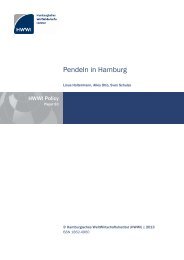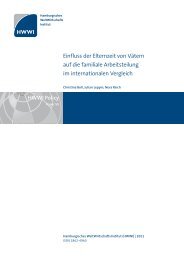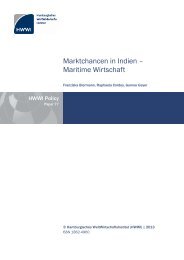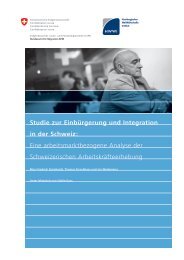Evaluation in der deutschen Entwicklungszusammenarbeit - HWWI
Evaluation in der deutschen Entwicklungszusammenarbeit - HWWI
Evaluation in der deutschen Entwicklungszusammenarbeit - HWWI
Sie wollen auch ein ePaper? Erhöhen Sie die Reichweite Ihrer Titel.
YUMPU macht aus Druck-PDFs automatisch weboptimierte ePaper, die Google liebt.
194 Axel Borrmann & Re<strong>in</strong>hard Stockmann<br />
473. <strong>Evaluation</strong>s must be timely <strong>in</strong> the sense that they should be available at a time which is<br />
appropriate for the decision-mak<strong>in</strong>g process. This suggests that evaluation has an important<br />
role to play at various stages dur<strong>in</strong>g the execution of a project or programme and should not<br />
be conducted only as an ex post exercise. Monitor<strong>in</strong>g of activities <strong>in</strong> progress is the<br />
responsibility of operational staff. Provisions for evaluation by <strong>in</strong>dependent evaluation<br />
staffs <strong>in</strong> the plan of operation constitute an important complement to regular monitor<strong>in</strong>g.<br />
VI. Participation of donors and recipients<br />
474. Consistent with the partnership pr<strong>in</strong>ciple stressed above, whenever possible, both<br />
donors and recipients should be <strong>in</strong>volved <strong>in</strong> the evaluation process. S<strong>in</strong>ce evaluation<br />
f<strong>in</strong>d<strong>in</strong>gs are relevant to both parties, evaluation terms of reference should address issues of<br />
concern to each partner, and the evaluation should reflect their views of the effectiveness<br />
and impact of the activities concerned. The pr<strong>in</strong>ciple of impartiality and <strong>in</strong>dependence<br />
dur<strong>in</strong>g evaluation should apply equally to recipients and donors. Participation and<br />
impartiality enhance the quality of evaluation, which <strong>in</strong> turn has significant implications for<br />
long-term susta<strong>in</strong>ability s<strong>in</strong>ce recipients are solely responsible after the donor has left.<br />
475. Whenever appropriate, the views and expertise of groups affected should form an<br />
<strong>in</strong>tegral part of the evaluation.<br />
476. Involv<strong>in</strong>g all parties concerned gives an opportunity for learn<strong>in</strong>g by do<strong>in</strong>g and will<br />
strengthen skills and capacities <strong>in</strong> the recipient countries, an important objective which<br />
should also be promoted through tra<strong>in</strong><strong>in</strong>g and other support for <strong>in</strong>stitutional and<br />
management development.<br />
VII. Donor co-operation<br />
477. Collaboration between donors is essential <strong>in</strong> or<strong>der</strong> to learn from each other and to<br />
avoid duplication of effort. Donor collaboration should be encouraged <strong>in</strong> or<strong>der</strong> to develop<br />
evaluation methods, share reports and <strong>in</strong>formation, and improve access to evaluation<br />
f<strong>in</strong>d<strong>in</strong>gs. Jo<strong>in</strong>t donor evaluations should be promoted <strong>in</strong> or<strong>der</strong> to improve un<strong>der</strong>stand<strong>in</strong>g of<br />
each others' procedures and approaches and to reduce the adm<strong>in</strong>istrative burden on the<br />
recipient. In or<strong>der</strong> to facilitate the plann<strong>in</strong>g of jo<strong>in</strong>t evaluations, donors should exchange<br />
evaluation plans systematically and well ahead of actual implementation.<br />
VIII. <strong>Evaluation</strong> programm<strong>in</strong>g<br />
478. An overall plan must be developed by the agency for the evaluation of development<br />
assistance activities. In elaborat<strong>in</strong>g such a plan, the various activities to be evaluated should<br />
be organised <strong>in</strong>to appropriate categories. Priorities should then be set for the evaluation of<br />
the categories and a timetable drawn up.<br />
479. These categories must represent the various areas of development assistance. The most<br />
frequent type of evaluation will probably be at the project or <strong>in</strong>stitutional level, but it is<br />
unlikely that such evaluations alone will meet all of the evaluation needs because of the<br />
specific nature of their f<strong>in</strong>d<strong>in</strong>gs. What is often needed is evaluation on a more<br />
comprehensive scale and an aggregation of evaluation results. <strong>Evaluation</strong> programm<strong>in</strong>g<br />
must take <strong>in</strong>to account the special demands by senior management and policy makers and<br />
synthesize studies of lessons learned.


